Plant-Based Biologics Market Research, 2031
The global plant-based biologics market size was valued at $116.1 million in 2021, and is projected to reach $182.9 million by 2031, growing at a CAGR of 4.8% from 2022 to 2031. Plant-based biologics are the result of an advanced application of biotechnology on plants that allows them to create therapeutic proteins. These proteins are extremely powerful in fighting life-threatening diseases such as HIV, Alzheimer's, heart disease, diabetes, cancer, and cystic fibrosis.
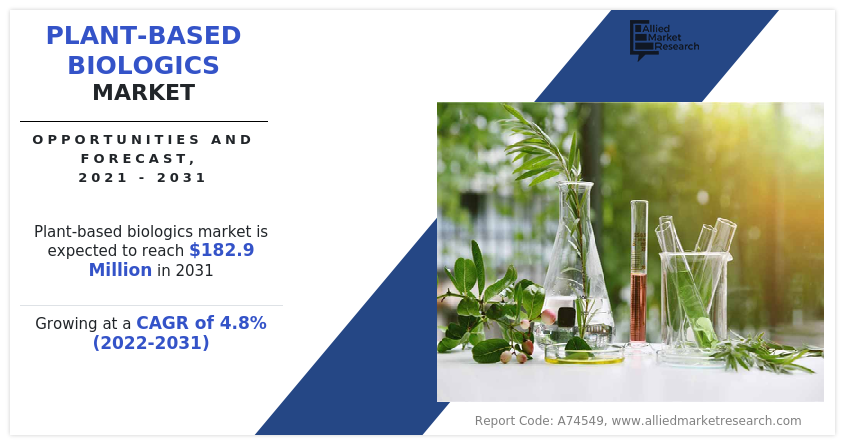
Proteins are used in medicine for a variety of purposes, such as medications, vaccinations, and diagnostic tools. The growth in demand for these proteins has prompted the development of new industrial-scale production technologies. Protein production has traditionally relied on microbial fermentation and mammalian cell lines, which have limitations in terms of cost, scalability, and safety. Plant-based systems have emerged as a promising alternative for producing recombinant proteins. Cost-effectiveness, scalability, and the absence of risks related to contamination by endotoxins or human pathogens are just a few benefits that plants can provide. One unique advantage of plant-based systems is the capacity to manufacture vaccine candidates in edible plant parts, allowing vaccines to be administered as unprocessed or partially processed material. This has the potential to expand vaccination accessibility, particularly in underdeveloped nations where vaccine production and delivery resources are limited.
The use of plants in the production of recombinant proteins has the potential to revolutionize the biologics industry by providing a safe, cost-effective, and scalable platform for the production of a wide range of medical products.
The plant-based biologics market size may face competition from other platforms, such as microbial fermentation and mammalian cell lines. These platforms are well-established in the biologics business and have a track record of creating high-quality products, which may make it difficult for plant-based biologics to gain a foothold in the plant-based biologics market share.
Plant-based biologics are being increasingly employed in the production of vaccines. Plant-based vaccines have various advantages over traditional vaccinations, including lower manufacturing costs, shorter production times, and higher scalability. In addition, plant-based vaccinations are easier to store and transport, making them ideal for use in rural or resource-limited places. Moreover, plant-based biologics are being used in the development of therapeutics. Plant-based monoclonal antibodies, for example, have been demonstrated to be particularly effective in the treatment of a variety of diseases, including cancer and autoimmune disorders. Furthermore, plant-based proteins are exploited to produce innovative therapeutics for a variety of other illnesses, including diabetes and cardiovascular disease.
The key players invest a lot of effort in the R&D of smart and unique strategies to sustain their growth in the market. These strategies include product launches, mergers & acquisitions, collaborations, partnerships, and refurbishing of existing technology. In January 2022, BAT announced the launch of KBio Holdings Limited (KBio) to accelerate the R&D and production of novel treatments. KBio leveraged the existing and extensive plant-based technology capabilities of BAT and Kentucky BioProcessing Inc (KBP), the existing BAT-owned U.S. plant biologics organization.
The key players profiled in plant-based biologics market forecast report include Leaf Expression Systems, Zea Biosciences, Planet Biotechnology Inc., InVitria, PlantForm Corporation, IBIO, Inc., Mapp Biopharmaceutical, Inc., Pfizer Inc., Ventria Bioscience Inc., Medicago Inc., and Eleva GmbH
The global plant-based biologics market share is segmented on the basis of product type, source, and region. On the basis of product type, the market is divided into leaf-based, seed-based, fruit-based, and others. On the basis of source the market is divided into carrot, tobacco, rice, duckweed, and others. On the basis of target disease, the market is divided into Gaucher disease, Fabry disease, and others. On the basis of region, the market is analyzed across North America, Europe, Asia-Pacific, and LAMEA.
The plant-based biologics market is segmented into Product Type, Source and Target Disease.
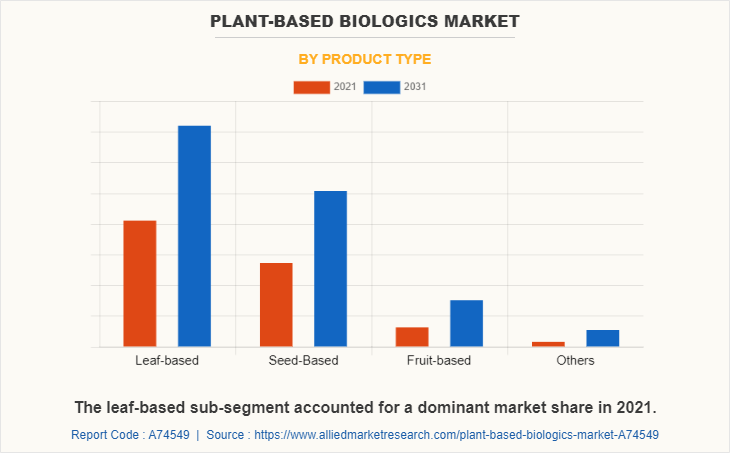
On the basis of product type, the leaf-based sub-segment accounted for a dominant market share in 2021. Biologics generated from plant leaves, such as tobacco, alfalfa, and lettuce, are included in this sub-segment. The substantial usage of tobacco plants in the manufacturing of plant-based biologics may be linked to the high plant-based biologics market growth. Tobacco plants are commonly used in the manufacturing of biologics due to their high biomass yield and rapid growth rate. In addition, tobacco plants have a number of other benefits, such as the capacity to produce large amounts of protein and the simplicity of genetic manipulation. As a result, tobacco plants have become a favored alternative for the manufacturing of plant-based biologics.
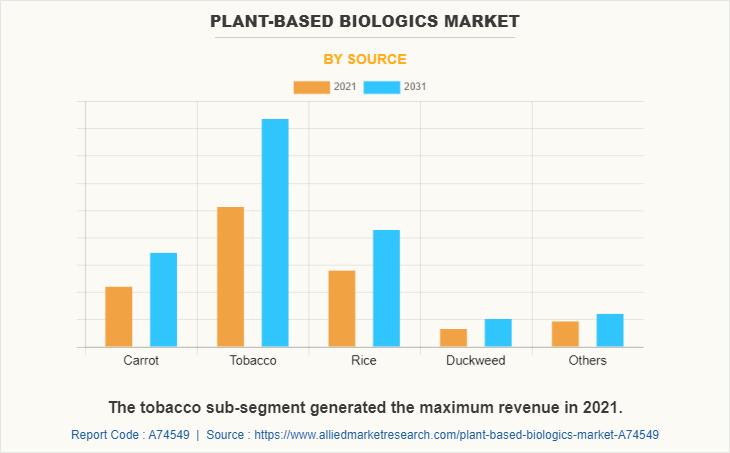
On the basis of source, the tobacco sub-segment accounted for a dominant market share in 2021. The tobacco plant has been the preferred choice as a host plant for producing recombinant antibodies since 1988 due to its fast growth rate and high volume of production. Other plants, such as maize, wheat, tomato, potato, mustard, banana, and soybean, have also been used for pharmaceutical production, but tobacco remains the most commonly used. Tobacco plants are easy to infect with foreign genes coding for the protein, and they express foreign products much more quickly than with bioreactors, which may significantly reduce production costs. In addition, tobacco plants have a high tendency to accept foreign proteins, and they do not require much maintenance, which makes them a cost-effective choice for biologic production.
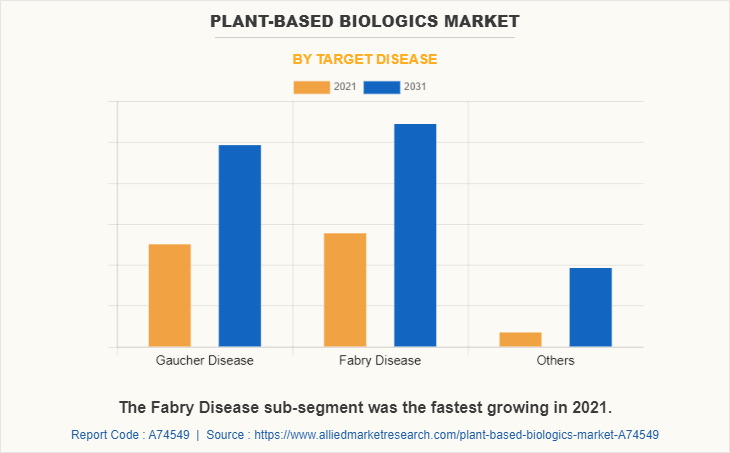
On the basis of target disease, the Fabry disease sub-segment accounted for a dominant market share in 2021. Fabry disease is a rare genetic disorder that results from the accumulation of a specific type of fatty substance called globotriaosylceramide (Gb3) in the body's cells, leading to a range of symptoms including pain, fatigue, skin rashes, and organ damage. Plant-based biologics have emerged as a promising new class of treatments for Fabry disease, offering several potential advantages over traditional therapies. One of the key advantages of plant-based biologics for Fabry disease is that they are produced using genetically engineered plants, which can be grown quickly and inexpensively in large quantities.
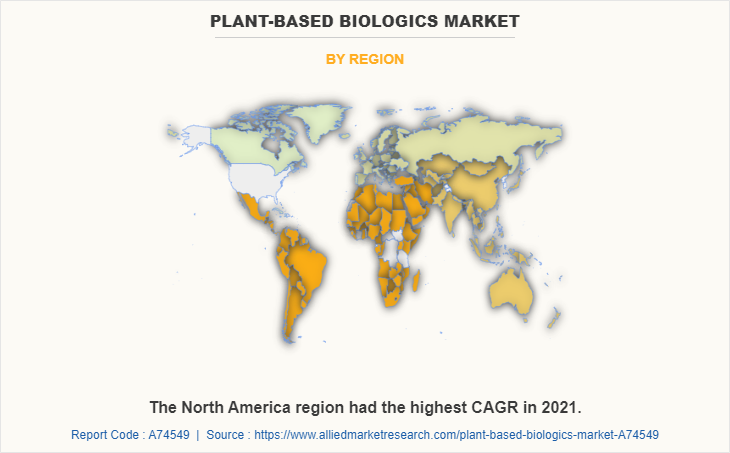
On the basis of region, North America generated the maximum revenue in 2021. The U.S. is the largest market for plant-based biologics in North America, accounting for a considerable share of the market value. The U.S. is home to several notable players in the industry, such as Kentucky BioProcessing, Medicago, and Ventria Bioscience, which have contributed to the development of the market in the region. Furthermore, the growth in demand for plant-based products and the demand for sustainable and eco-friendly products drive the expansion of the plant-based biologics market in North America. The region has well-established healthcare systems, which have enabled the widespread adoption of plant-based biologics market opportunity in the healthcare sector.
Impact of COVID-19 on the Global Plant-based Biologics Industry
- The increased demand for vaccines and treatments has been one of the most notable effects of COVID-19 on the plant-based biologics business. Many businesses in the plant-based biologics industry have focused their attention on the creation of COVID-19 vaccines and treatments. For instance, Kentucky BioProcessing, a division of British American Tobacco, has been developing a COVID-19 vaccine using its plant-based biologics technology.
- The pandemic has also heightened concerns about creating plant-based biologics for other diseases. The pandemic has underlined the significance of creating novel medicines for infectious diseases, and the plant-based biologics industry is well-positioned to meet this demand.
- The pandemic has disrupted supply chains and caused manufacturing facilities to close, affecting the manufacture and delivery of plant-based biologics. Moreover, due to the pandemic, clinical trials and regulatory approvals have been postponed, slowing the development of novel plant-based biologics.
Key Benefits For Stakeholders
- This report provides a quantitative analysis of the market segments, current trends, estimations, and dynamics of the plant-based biologics market analysis from 2021 to 2031 to identify the prevailing plant-based biologics market opportunities.
- The market research is offered along with information related to key drivers, restraints, and opportunities.
- Porter's five forces analysis highlights the potency of buyers and suppliers to enable stakeholders make profit-oriented business decisions and strengthen their supplier-buyer network.
- In-depth analysis of the plant-based biologics market segmentation assists to determine the prevailing market opportunities.
- Major countries in each region are mapped according to their revenue contribution to the global market.
- Market player positioning facilitates benchmarking and provides a clear understanding of the present position of the market players.
- The report includes the analysis of the regional as well as global plant-based biologics market trends, key players, market segments, application areas, and market growth strategies.
Plant-Based Biologics Market Report Highlights
| Aspects | Details |
| Market Size By 2031 | USD 182.9 million |
| Growth Rate | CAGR of 4.8% |
| Forecast period | 2021 - 2031 |
| Report Pages | 300 |
| By Product Type |
|
| By Source |
|
| By Target Disease |
|
| By Region |
|
| Key Market Players | Eleva GmbH, InVitria, Zea Biosciences, plantform corporation, IBIO, Inc., Planet Biotechnology Inc., Leaf Expression Systems, Mapp Biopharmaceutical, Inc., Ventria Bioscience Inc., Medicago Inc. |
Analyst Review
Plant-based biologics have various advantages over mammalian cell culture-based production platforms, including reduced costs, greater scalability, and faster turnaround times. Plants can also synthesize complex proteins that are difficult to create in other ways, and they can do it without propagating human infections or other mammalian pollutants. These advantages make plant-based biologics an appealing option for generating biologic therapeutics to address the growing need for treatments. Also, the regulatory landscape for plant-based biologics is still evolving, and it can be challenging to navigate the complex regulatory requirements for manufacturing and commercializing plant-based biologics. are the factors expected to hamper the Plant-based biologics market share. The growing global demand for biologics, driven by the rise in chronic diseases, has led to the rapid growth of the plant-based biologics market. Plants are becoming an increasingly popular choice for biologic production due to their ability to eliminate potential contamination from adventitious agents, which can be a concern in traditional mammalian and bacterial systems. These factors are anticipated to boost the plant-based biologics market growth.
Among the analyzed regions, North America is expected to account for the highest revenue in the market by the end of 2031, followed by Asia-Pacific, Europe, and LAMEA. The North American plant-based biologics market is predicted to increase significantly due to rising biologics demand and technological improvements. The presence of big pharmaceutical companies in the region, together with favorable government policies and legislation encouraging biologics development, is also projected to fuel market expansion.
The global plant-based biologics market is driven by several factors, including the growth in demand for biologics due to the rise in chronic diseases such as cancer, diabetes, and cardiovascular diseases.
The major growth strategies adopted by plant-based biologics market players are investment and agreement.
Asia-Pacific region is anticipated to provide more business opportunities for the global Plant-based biologics market in future.
The Leaf Expression Systems, Zea Biosciences, Planet Biotechnology Inc., InVitria, PlantForm Corporation, IBIO, Inc., Mapp Biopharmaceutical, Inc., Pfizer Inc., Ventria Bioscience Inc., Medicago Inc., and Eleva GmbH are the major players in the Plant-based biologics market.
The tobacco sub-segment of the application subsegment acquired the maximum share of the global plant-based biologics market in 2021.
The potential customers of the plant-based biologics industry include pharmaceutical and biotech companies, academic and research institutions, healthcare providers, and government organizations.
The report provides an extensive qualitative and quantitative analysis of the current trends and future estimations of the global plant-based biologics market from 2021 to 2031 to determine the prevailing opportunities.
Loading Table Of Content...
Loading Research Methodology...



